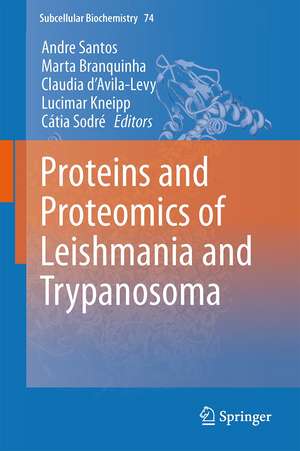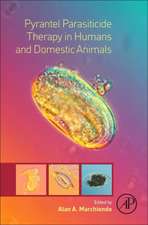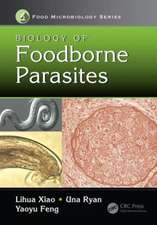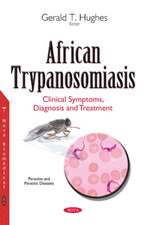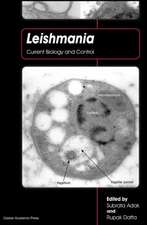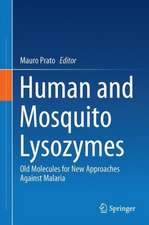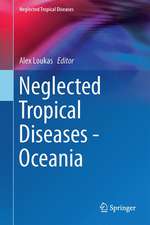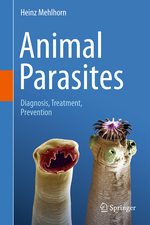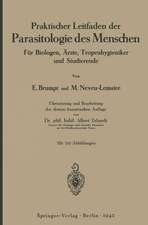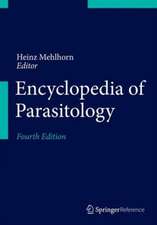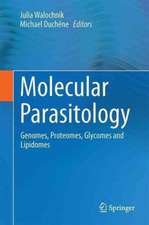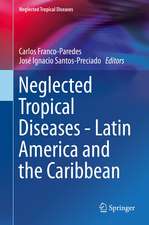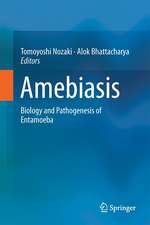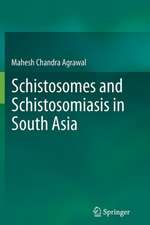Proteins and Proteomics of Leishmania and Trypanosoma: Subcellular Biochemistry, cartea 74
Editat de André L.S. Santos, Marta H. Branquinha, Claudia M. d’Avila-Levy, Lucimar F. Kneipp, Cátia L. Sodréen Limba Engleză Hardback – 10 dec 2013
| Toate formatele și edițiile | Preț | Express |
|---|---|---|
| Paperback (1) | 949.10 lei 6-8 săpt. | |
| SPRINGER NETHERLANDS – 18 sep 2016 | 949.10 lei 6-8 săpt. | |
| Hardback (1) | 955.08 lei 6-8 săpt. | |
| SPRINGER NETHERLANDS – 10 dec 2013 | 955.08 lei 6-8 săpt. |
Din seria Subcellular Biochemistry
- 18%
 Preț: 948.79 lei
Preț: 948.79 lei - 5%
 Preț: 1456.88 lei
Preț: 1456.88 lei - 18%
 Preț: 1373.84 lei
Preț: 1373.84 lei - 18%
 Preț: 1243.78 lei
Preț: 1243.78 lei - 18%
 Preț: 2098.81 lei
Preț: 2098.81 lei - 18%
 Preț: 1122.10 lei
Preț: 1122.10 lei - 5%
 Preț: 1160.63 lei
Preț: 1160.63 lei - 18%
 Preț: 1396.26 lei
Preț: 1396.26 lei - 18%
 Preț: 1114.96 lei
Preț: 1114.96 lei - 18%
 Preț: 1224.68 lei
Preț: 1224.68 lei - 18%
 Preț: 951.29 lei
Preț: 951.29 lei - 18%
 Preț: 1227.99 lei
Preț: 1227.99 lei -
 Preț: 398.15 lei
Preț: 398.15 lei -
 Preț: 399.88 lei
Preț: 399.88 lei - 18%
 Preț: 1231.47 lei
Preț: 1231.47 lei - 18%
 Preț: 1230.35 lei
Preț: 1230.35 lei -
 Preț: 392.60 lei
Preț: 392.60 lei - 18%
 Preț: 1231.47 lei
Preț: 1231.47 lei - 15%
 Preț: 638.76 lei
Preț: 638.76 lei - 5%
 Preț: 656.26 lei
Preț: 656.26 lei -
 Preț: 389.49 lei
Preț: 389.49 lei - 5%
 Preț: 659.19 lei
Preț: 659.19 lei -
 Preț: 392.37 lei
Preț: 392.37 lei - 5%
 Preț: 662.09 lei
Preț: 662.09 lei -
 Preț: 395.09 lei
Preț: 395.09 lei - 5%
 Preț: 667.99 lei
Preț: 667.99 lei -
 Preț: 400.47 lei
Preț: 400.47 lei - 18%
 Preț: 1224.54 lei
Preț: 1224.54 lei - 15%
 Preț: 647.73 lei
Preț: 647.73 lei - 15%
 Preț: 646.75 lei
Preț: 646.75 lei - 5%
 Preț: 662.30 lei
Preț: 662.30 lei -
 Preț: 395.25 lei
Preț: 395.25 lei - 18%
 Preț: 1230.21 lei
Preț: 1230.21 lei - 18%
 Preț: 1231.95 lei
Preț: 1231.95 lei - 18%
 Preț: 964.54 lei
Preț: 964.54 lei
Preț: 955.08 lei
Preț vechi: 1164.73 lei
-18% Nou
Puncte Express: 1433
Preț estimativ în valută:
182.75€ • 190.82$ • 150.91£
182.75€ • 190.82$ • 150.91£
Carte tipărită la comandă
Livrare economică 15-29 aprilie
Preluare comenzi: 021 569.72.76
Specificații
ISBN-13: 9789400773042
ISBN-10: 9400773048
Pagini: 392
Ilustrații: X, 381 p. 55 illus., 37 illus. in color.
Dimensiuni: 155 x 235 x 40 mm
Greutate: 0.72 kg
Ediția:2014
Editura: SPRINGER NETHERLANDS
Colecția Springer
Seria Subcellular Biochemistry
Locul publicării:Dordrecht, Netherlands
ISBN-10: 9400773048
Pagini: 392
Ilustrații: X, 381 p. 55 illus., 37 illus. in color.
Dimensiuni: 155 x 235 x 40 mm
Greutate: 0.72 kg
Ediția:2014
Editura: SPRINGER NETHERLANDS
Colecția Springer
Seria Subcellular Biochemistry
Locul publicării:Dordrecht, Netherlands
Public țintă
ResearchCuprins
Preface.- Biology of Human Pathogenic Trypanosomatids: Epidemiology, Lifecycle and Ultrastructure.- Selection of Molecular Targets for Drug Development against Trypanosomatids.- A2 and other visceralizing proteins of Leishmania: role in pathogenesis and application for vaccine development.- Arginase in Leishmania.- The heat shock proteins of Trypanosoma cruzi.- The Gp82 Surface Molecule of Trypanosoma cruzi Metacyclic Forms.- The Gp85 Surface Glycoproteins from Trypanosoma cruzi.- Trypanosoma cruzi Trans-Sialidase: Structural Features and Biological Implications.- Surface Topology Evolution of Trypanosoma Trans-Sialidase.- Ecto-Nucleotidases and Ecto-Phosphatases from Leishmania and Trypanosoma Parasites.- Gp63 Function in the Interaction of Trypanosomatids with the Invertebrate Host – Facts and Prospects.- Highlights on Trypanosomatid Aminoacyl-tRNA Synthesis.- The Expected Outcome of the Trypanosoma cruzi Proteomic Map: a Review of its Potential Biological Applications for Drug Target Discovery.- Proteomics advances in the study of Leishmania parasites and leishmaniasis.- Towards the Phosphoproteome of Trypanosomatids. Index.
Recenzii
From the book reviews:
“This is an updated review of the current understanding of the molecular, cellular biology, and biochemistry aspects, including protein expression and functions of the two protozoan parasitic genera, Leishmania and Trypanosoma. … this is a good book for both undergraduate and postgraduate students as well as researchers in the field. … This is a well-organized book outlining the current understanding of the biology and biochemistry of two important parasitic agents.” (Vaibhav Tiwari, Doody’s Book Reviews, January, 2015)
“This is an updated review of the current understanding of the molecular, cellular biology, and biochemistry aspects, including protein expression and functions of the two protozoan parasitic genera, Leishmania and Trypanosoma. … this is a good book for both undergraduate and postgraduate students as well as researchers in the field. … This is a well-organized book outlining the current understanding of the biology and biochemistry of two important parasitic agents.” (Vaibhav Tiwari, Doody’s Book Reviews, January, 2015)
Textul de pe ultima copertă
This book contains a collection of critical reviews on the expression of biologically functional proteins in Leishmania and Trypanosoma, which was written by renowned researchers on this field. Species belonging to these trypanosomatids’ genera are etiological agents of leishmaniasis, Chagas’ disease and sleeping sickness that are extremely debilitating human infection diseases, which remain a major health problem especially in countries from Latin America, Africa and Middle East. Substantiating the problem, the currently accepted drugs for these diseases are quiet unsatisfying due to their low efficacy and high toxicity. In order to solve these real problems, several research groups around the world have become involved in the study and identification of novel potential targets in the trypanosomatid cell. Since proteins are key macromolecules involved in crucial metabolic processes of all living cells, studies have focused on the expression of specific proteins produced by Leishmania and Trypanosoma by means of different biochemical, molecular and proteomic approaches in order to explore them as targets for understanding the parasite life cycle and developing new strategies against trypanosomiasis. With these proposals in mind, the book “Proteins and Proteome of Leishmania and Trypanosoma” encompasses (i) an integrated view about the biochemistry of parasites belonging to the Leishmania and Trypanosoma genera; (ii) an updated review on the expression of biologically relevant proteins by human pathogenic trypanosomatids and their possible role in the interaction with host cells/molecules as well as a target for development of both alternative chemotherapies and vaccine; and (iii) several pictures, diagrams and tables that can be used to illustrate both undergraduate and postgraduate teaching as well as scientific lectures, being a useful resource for students and researchers.
Caracteristici
The book presents an integrated view about the biochemistry of parasites belonging to the Leishmania and Trypanosoma genera The book contains an updated review on the expression of biologically relevant proteins by human pathogenic trypanosomatids and their possible role in the interaction with host cells The chapters contain several pictures, diagrams and tables that can be used to illustrate both undergraduate and postgraduate teaching as well as scientific lectures
